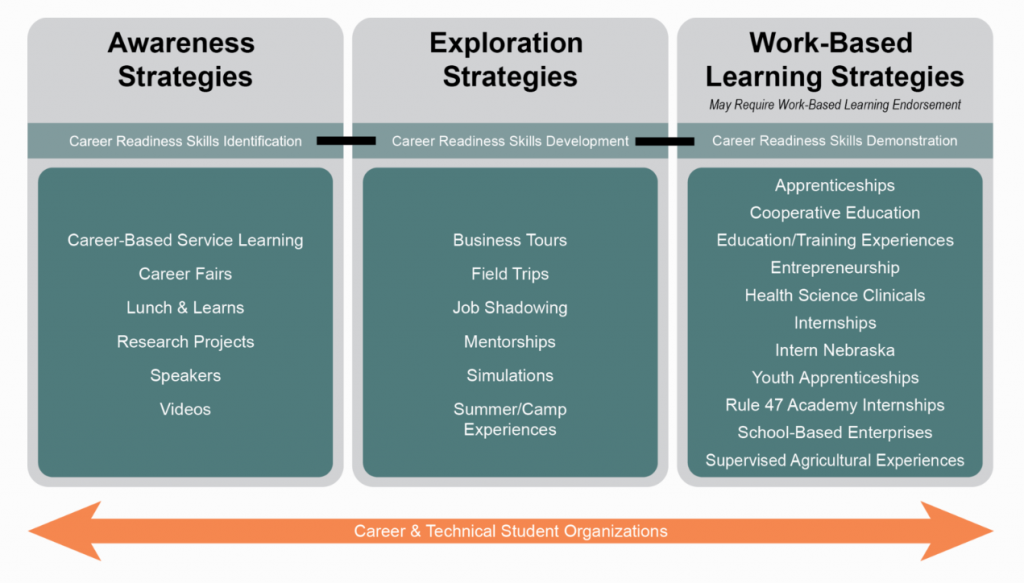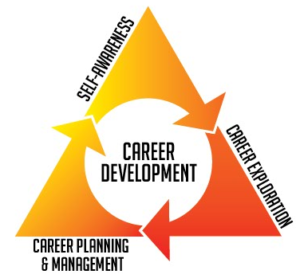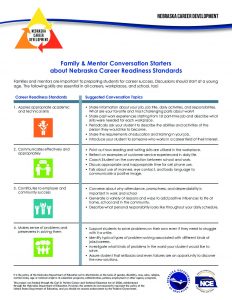Family Engagement
Families are vitally important to student college and career readiness!
What do you need to know?
Successful career development programs focus on partnerships with families. Consistently, students rank parents/families at the top of the list as a main source of information for college and careers. Knowing that to be commonly true, it is imperative that families have accurate information. Engage families throughout PreK-12+ to keep them up-to-date about career development topics.
Provide instruction to families and student mentors about sources of current, valid and reliable career information. Incorrect information is harmful to students or anyone making important career decisions. Be sure to validate resources before using them in a career development program. Resources posted within this toolkit are vetted and ready to use or share.
Families want their children to have exposure to developing career readiness skills.
Career readiness skills are essential skills that apply at work, at school and at home! Start using a common language early to develop a college and career readiness culture. Provide parents with Nebraska Career Readiness Standards information.
Families want communication, but not too little or not too much!
Identify different avenues to provide the necessary information for families to participate in the career exploration process. Consider all communication is provided in multiple languages if necessary. Develop a PreK-12+ plan of communication with families. Engaged parents help assure the success of career exploration of all students.
- Monthly newsletters, texts, blogs
- Social Media – Facebook, Twitter
- School website
- Share and post valuable websites (be selective, not too many)
http://h3.ne.gov/H3/ https://www.bls.gov/ooh
http://nebraskacommunitycolleges.org/programs/ www.getmyfuture.com
www.nebraskacareerconnections.org
- Create a parent webpage offering brochures, videos, webinars, helpful tips and timelines.
Families want to participate in building their child’s Personal Learning Plan (PLP). Families of youth with disabilities
Families of youth with disabilities want to have a voice to ensure the same opportunities in exploring career options and experiences in the Individual Education Plan (IEP) or Individual Pre-Employment Plan (IPE). Provide a variety of family friendly hours for virtual or in-person meetings.
- Invite parents to be part of the registration process. Review career assessments before building a PLP and selecting classes for future years. Inform families of all core academics, career education programs/academies, dual/college credit, honors or special programs, activities, early-college etc. so they can discuss options with their student.
- Implement Student-Lead Parent Teacher Conferences for student to take ownership in presenting their own progress in accomplishing their Personal Learning Plan to assure they are taking the classes necessary for career and post-secondary success.
- Create a Parent University program or workshop (virtual and/or in person) aimed at how to best support students, PLP’s and college and career readiness.
- Offer Open-Houses or coordinate with other activities/events parents attend.
- Consider online meetings for families who have technology capacity.
- Connect families to EducationQuest.org for college planning services, assist with FAFSA and financial aid to higher education.
- Inform families of students with disabilities about coordination of services for career development between general education, special education and Nebraska VR.
Families want their children to have more opportunities for exposure in real work experiences.
Inform families of workplace experiences available through school, special education, Nebraska VR and your community.
 Leverage community partnership to develop a continuum of workplace experience PreK-12+ for the career development program. Learn more at: www.nebraskaworkplaceexperiences.com
Leverage community partnership to develop a continuum of workplace experience PreK-12+ for the career development program. Learn more at: www.nebraskaworkplaceexperiences.com
Families want support for researching all postsecondary career options including: certificates, diplomas, apprenticeships, associate degrees and bachelor’s degrees.
- Parents want career development curriculum in schools and to be involved with college and career planning.
- The Nebraska Career Connections website provides invaluable education and career planning resources for students and parents. Parents are able to log in to their child’s account and view assessment results. These results identify interest, strengths and values related to careers of interest, skills and activities associated with careers and identify training and educational requirements to successfully pursue those careers. Schools should offer instructions for how a parent can create a parent account, with or without a link to their student’s portfolio.
Inform Families: What is Dual Credit?
- Opportunities to achieve high school and college credit while in high school.
Inform Families: Why Dual Credit?
- It saves time and money. Students can reduce the duplication of courses.
- Students are exposed to college level work which may determine future education goals and planning.
- Opportunities for reduced rate tuition which may lower the overall cost of college education.
- May expedite college graduation or allow for dual-majors or more in-depth course work in college.
- Data shows dual credit students earn higher grade point averages than their peers, are more likely to graduate from high school, are more likely to attend college and more likely to return for their sophomore year of college. (Community College Research Center)
Download this brochure from: https://www.education.ne.gov/CARED/
Families of youth with disabilities want to have a voice in building their child’s personal learning plan and to assure the same opportunities in exploring career options and experiences.
These resources will help guide equity and access for students with disabilities.
General Education, Special Education, and the Nebraska VR need to collaborate with families to provide career educational experiences to students. The opportunity to experience career based learning has been shown to increase employment success for all students. (NCWD/Youth)







